The 4 Best VPNs for Russia in 2022
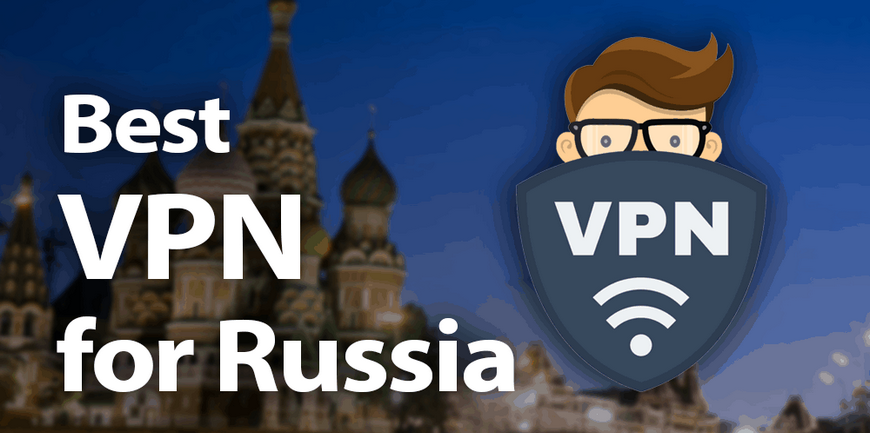
Russia’s stranglehold on internet freedom dates back to 2012 following street protests that lead to a ban on some websites. Over time, those bans were extended to cover thousands of sites. Recent events, particularly the invasion of Ukraine, have seen nearly all social media and news sites banned. How can you access these sites? Read on to find out the best Russia VPN.
Since the invasion of Ukraine, Russia has gone to great lengths to block independent news and social media sites. Russians no longer have access to Facebook, Twitter and Instagram, and sites like the BBC, DW and VOA, are no longer available.
The ultimate aim of the government is to control the narrative about the ongoing war. Exposing Russian citizens to what is going on in Ukraine might open their eyes to the truth, and this will erode confidence in the government.
There are many in Russia, citizens and foreigners, who are desperate to get the true picture of what is going on. They also want access to social media sites so that they can keep in touch with friends, family and colleagues in other parts of the world.
For anyone wishing to access the outside world from Russia, a VPN is a no-brainer.
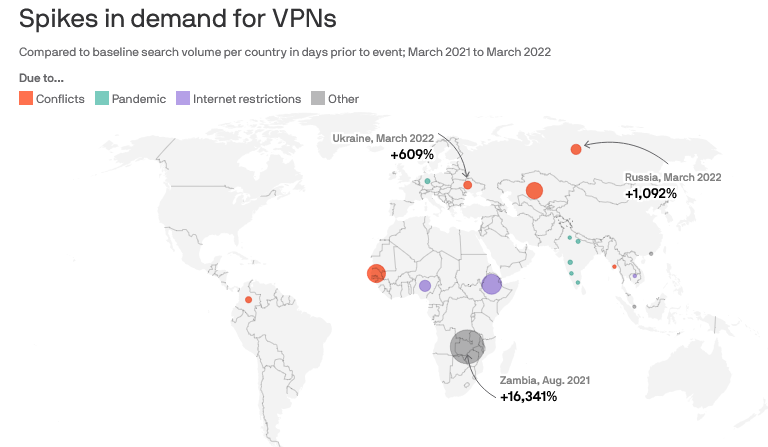
According to a report by VOA, downloads for “Top 10 VPNs in Russia” surged by more than 4,000%, from a daily average of 16,000 to 700,000 daily.
According to an article in The Guardian, there were more than 260,000 searches for VPNs the day after Facebook was banned.
Watching TV is also a challenge; inside Russia, consumers only have access to state-sponsored sites.
If you are in Russia, a VPN might be the only way for you to keep in touch with the issues.
Table of Contents
Why Use a VPN in Russia?
You need a VPN in Russia because many sites are banned/blocked. When you try to access a blocked site, you see an error message like the one below.
One frequently asked question is why not use Tor in Russia; it is free and easy to connect to.
While Tor will help you access websites anonymously, it has one major drawback: it tends to lower internet speeds significantly. Your data is relayed through numerous connections.
A VPN slows down your connection but not by much.
Also, Tor doesn't encrypt traffic, and things like usernames and passwords are transmitted as plain text.
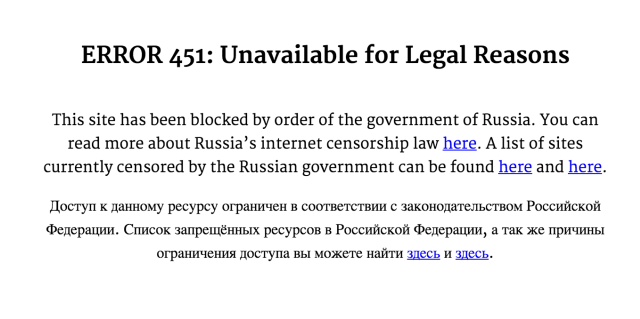
A VPN helps you connect to any website, including social media and news sites, without being detected. It changes your IP address so that to anyone looking at your online activity, it looks like you’re connected from another country altogether.
If you are in any country where certain sites are blocked, a VPN has a three-fold effect:
- It hides your real IP address, so authorities will have no interest in tracking you – to them, it appears that you’re in another country.
- You can access the blocked sites because even they cannot tell where you are. To them, you appear to be in a country where services are available.
- A VPN encrypts data. If anyone were to look at the data coming in or out of your devices, it is a useless jumble; the encryption is complex and extremely hard to decrypt.
In other words, you can go to any site you want, at any time, and no one can penalize you for it because to them, you are in a different location, not within Russia.
If by some chance, they should get access to your data, they still have to overcome the encryption bit – not an easy task.
A VPN also gives you access to most streaming platforms. You can access Netflix, YouTube, Amazon Prime, Disney+, BBC, BBC iPlayer and many others. A virtual private network will give you access to most major news sites as well.
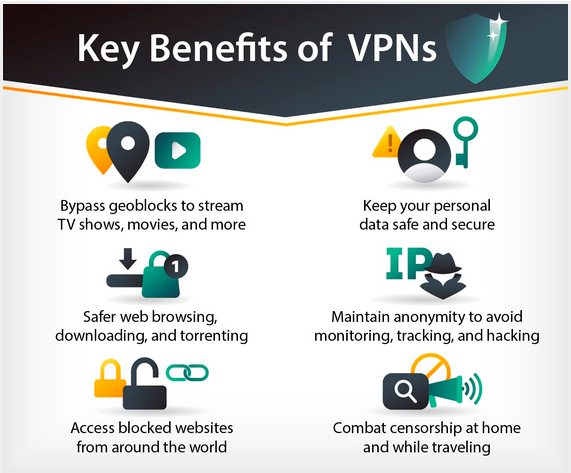
Note: For Russians who would like to keep up with what’s happening at home but are blocked from certain websites, a VPN is a handy and affordable way to access Russian news and streaming sites.
Are VPNs Banned in Russia?
Yes, and no. The Kremlin claims that it doesn’t ban VPN traffic, rather their ability to allow users to access “suicidal, child pornography and other prohibited content.”
Instead of a direct ban, the government asks VPNs to connect to the Federal State Information System (FSIS) so that the state can monitor internet traffic to banned sites.
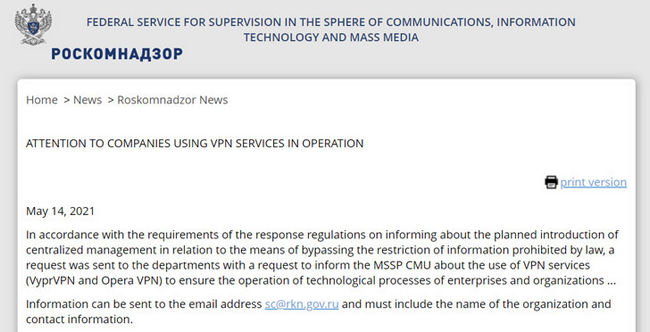
Back in 2018, the Russian authorities announced that they were blocking 50 proxy and VPN services because they were providing access to these sites.
The main reason for this, however, was that they wanted to restrict Telegram, the most popular messaging app in Russia. It works like WhatsApp or Facebook Messenger.
In March 2019, Kremlin instructed Roskomnadzor, the agency that supervises online activity in Russia, to contact VPN services that operated in the country and ask them to either shut down access to certain sites or face the consequences.
These included ExpressVPN, VyprVPN, IPVanish, OpenVPN, Kaspersky Secure Connection, TorGuard and HideMyAss VPN.
This was followed by a ban in early 2021 of 15 VPNs, including ExpressVPN, NordVPN, VyprVPN, IPVanish and Opera VPN.
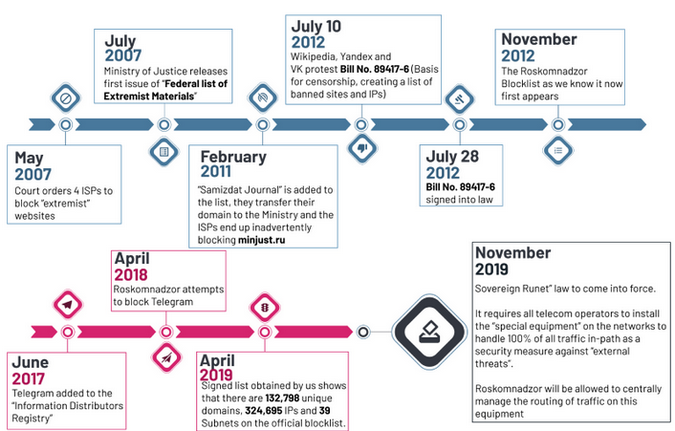
Later that same year, even more VPNs got the ax. Rather than participate in a state-sponsored bid to clamp down on freedom of information many of the VPNs opted to shut down their Russia servers.
NordVPN issued a statement: “Connecting to NordVPN servers in Russia may no longer be safe. To prevent any service disruptions or malfunctions, we will be shredding all of our Russian servers and removing them from our service.”
ExpressVPN responded in the same mien: “As a matter of principle, ExpressVPN will never cooperate with efforts to censor the internet by any country. Protecting privacy and freedom of expression online is part of our core mission, and we will continue to fight to keep users connected to the free and open internet, no matter where they are located.”
This doesn’t mean that VPN services are not available to Russians; rather the servers in that country are no longer operational. If you can buy a VPN and connect through a server in another country you’ll get access to any website.
How to Use a VPN in Russia
Hand in hand with the search for the best VPN in Russia are numerous searches for how to connect a VPN in Russia.
Fortunately, it is easy to connect a VPN for Russia, and we’ll go through the steps below.
UNFORTUNATELY, paying for a VPN in Russia is now difficult because the big global payment companies like Visa, American Express, MasterCard and PayPal have withdrawn their services from Russia. What are your options?
- The safest way to pay for a VPN in Russia today is using bitcoin. A good number of the top VPNs now accept this form of payment. That said, a lot of people don’t use cryptocurrency and don’t know how it works.
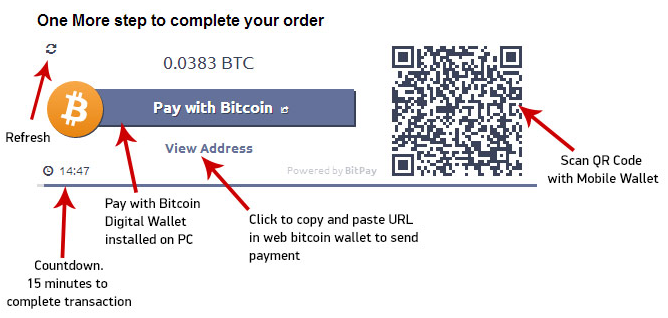

- For those people, the best alternative is to have someone outside Russia and Belarus buy a VPN for you and send you the login credentials. Here’s what they need to do:
- Ask them to buy a subscription to a good VPN. Do your homework and make sure that you choose one that is fast, reliable, and works in Russia.
- After they buy, they should send you the login credentials by email or text. These are the credentials that will allow you to log in to the account. Make sure you use a secure messaging app.
- Your friend or relative in Russia now only needs to download the app. If this proves difficult, ask the VPN company to send you a secure link that they can use to access the app, and send it to them.

- If you’re traveling into Russia or Belarus, download and install a VPN on your PC and mobile devices before you arrive.
Note: It makes sense to buy a VPN like Surfshark that allows multiple simultaneous connections. That way, one license gives a large group access to banned websites.

If you can pay for a VPN using bitcoin, here’s how to use a VPN in Russia:
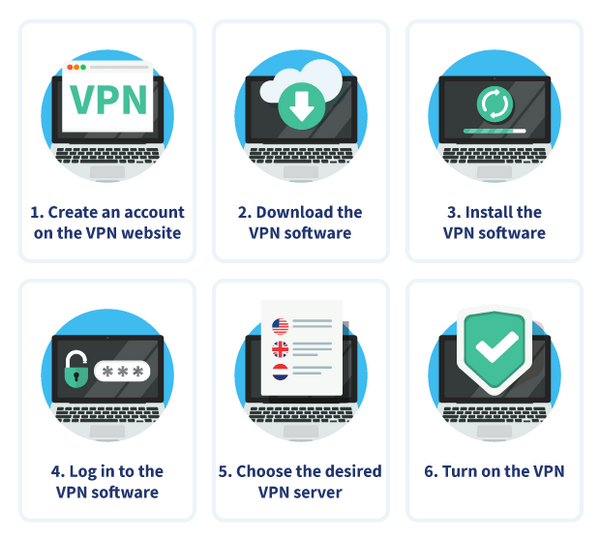
- Find a VPN that works for Russia and pick a subscription plan
- Register and pay for it
- Download the app into your devices as instructed on the website
- Clear cookies and the caches in your web browsers. This removes old location trackers
- Restart the device and then open the VPN app and log in
- Select a server from a different country
- You’ll be connected in a second or two, and the button on the app will turn green
- Try any blocked website – you should be able to access it without any trouble
The 4 Best VPNs in Russia
Read ReviewView ListingSurfshark
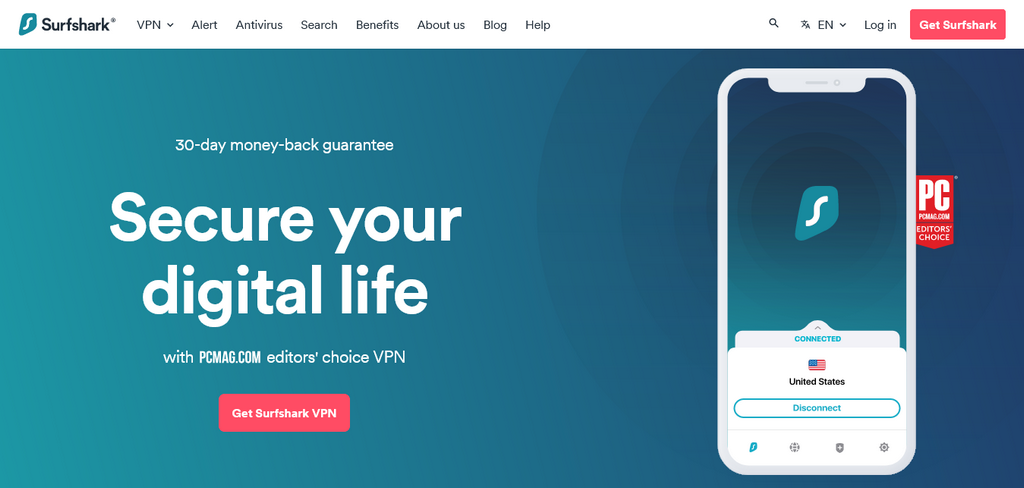
Surfshark was one of the few reliable VPN providers that remained operational in Russia until recently, but their servers were switched off on the 2nd of March, a couple of weeks after the war in Ukraine started.
This VPN allows you to pay using cryptocurrency, and that’s one of the things that makes it a top Russia VPN.
There’s so much more we like about Surfshark. It is fast and secure, and it allows unlimited simultaneous connections. This is especially relevant for users in Russia because a single license can provide secure connections for large groups of people.
Surfshark was one of the few reliable VPN providers that remained operational in Russia until recently, but their servers were switched off on the 2nd of March, a couple of weeks after the war in Ukraine started.
This VPN allows you to pay using cryptocurrency, and that’s one of the things that makes it a top Russia VPN.
There’s so much more we like about Surfshark. It is fast and secure, and it allows unlimited simultaneous connections. This is especially relevant for users in Russia because a single license can provide secure connections for large groups of people.
It also has a selection of features that makes it ideal to use in a country that has strict internet restrictions. These include No-Borders Mode, a kill switch and Camouflage mode.
| Pros | Cons |
| It has servers in Latvia, Estonia and Ukraine | Limited P2P servers – not the best if you're keen on torrenting |
| You can pay for it using cryptocurrency | Some servers are slow |
| The service is fast | Apple product apps could do with some improvement |
| It comes with apps for Windows, macOS, Android and iOS as well as Linux | |
| Online privacy features include CleanWeb, MultipHop and split tunneling | |
| You get unlimited simultaneous connections | |
| It is a great choice for streaming Netflix, Disney Plus, Amazon Prime and other platforms | |
| The VPN is ideal for gaming | |
| Surfshark uses powerful AES-256 military-grade encryption | |
| It has more than 3,200 servers | |
| The company is located in the British Virgin Islands | |
| You get a 30-day money-back guarantee |
Read ReviewView Listing
NordVPN
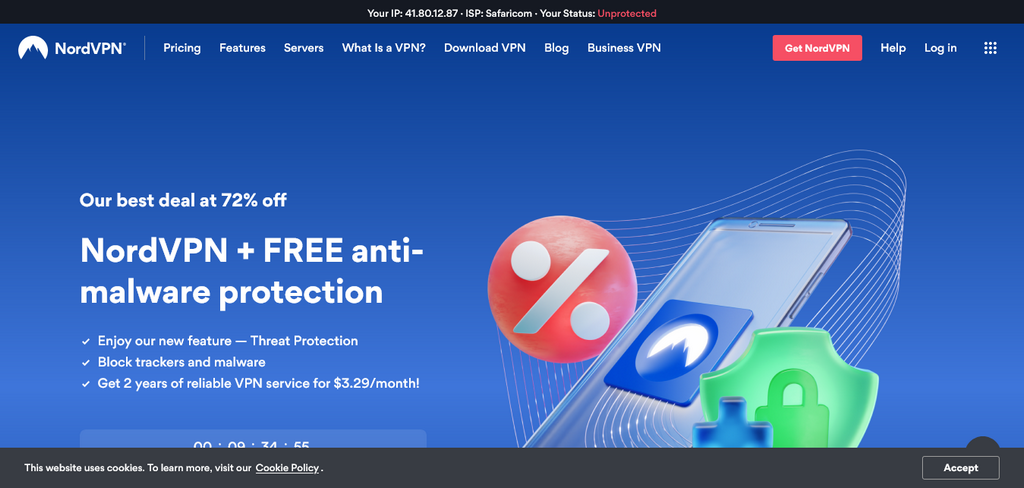
Although NordVPN remains at the top of our list for favorite VPNs, it is banned in Russia. However, you can still use it to access restricted sites in and outside Russia.
We like it because it has thousands of servers across the world, provides fast speeds and is secure.
The company has servers in Estonia, Latvia, Lithuania and Ukraine. However, the only way you can pay for NordVPN in Russia today is using cryptocurrency.
If you don’t have a crypto account, ask someone outside Russia to buy it for you and send you the login credentials using secure text.
| Pros | Cons |
| The company has servers in Lithuania, Estonia, Ukraine and Latvia | You only get 6 simultaneous connections |
| It provides fast speeds ideal for streaming and gaming | Buying and installing in Russia can be a hassle |
| You can pay for NordVPN using bitcoin | Some server locations are slow |
| It uses the best security protocols in the industry including AES-256 military-grade encryption | |
| The company has a wide server coverage as well as specialized servers | |
| The VPN doesn't keep user logs | |
| It has strong unblocking capabilities | |
| NordVPN has 5,000+ servers | |
| The company is in Panama City, Panama | |
| The software comes with a 30-day money-back guarantee |
Read ReviewView Listing
VyprVPN
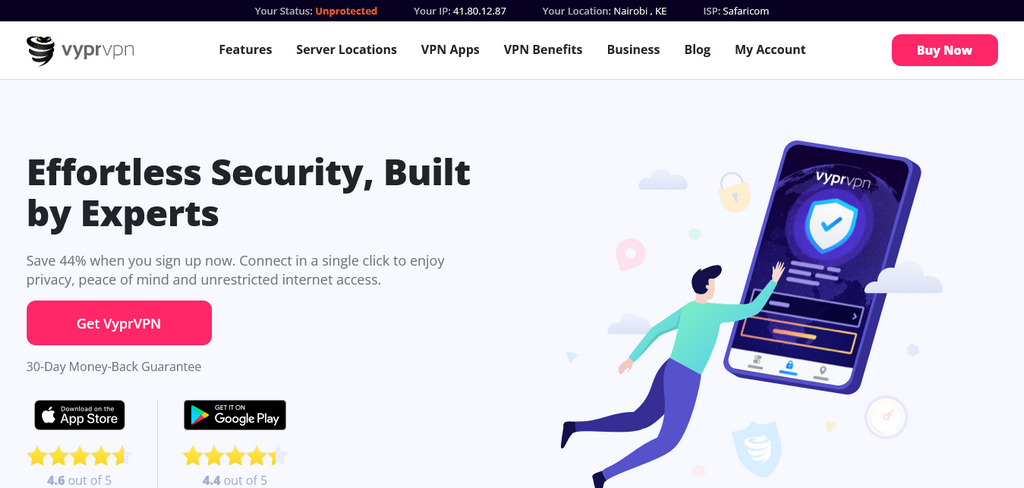
VyprVPN might not be as well-known as NordVPN or Surfshark, but when it comes to security and speed, it performs just as well as the industry giants.
Many people opt to give it a pass because it has a small server network, but they forget one important thing: the company owns and maintains its servers in-house, so users rarely experience connection problems or downtime.
It has servers in Latvia, Lithuania, Poland, Slovenia and Ukraine. It used to have Russian servers but they have since been shut down.
VyprVPN has lots of security features in place to keep users secure at all times. The main drawback at this time is that you cannot use cryptocurrency to pay for it; someone has to buy it for you outside Russia and send you the login credentials.
| Pros | Cons |
| It has servers in Lithuania, Slovenia, Ukraine and Latvia | It has a small server network |
| The VPN is secure; it uses industry-standard encryption and has additional security features | Speeds can be slow on some servers |
| It is fast; ideal for gaming and streaming | The company doesn't accept cryptocurrency payments |
| You can use it to watch Netflix, Amazon Prime, Disney Plus, BBC iPlayer and it will connect you to all major news websites | You can only connect 5 devices at a time |
| The company doesn't keep user logs | |
| It has 700+ servers | |
| The service is based in Switzerland | |
| You get a 30-day money-back guarantee |
Read ReviewView Listing
ExpressVPN
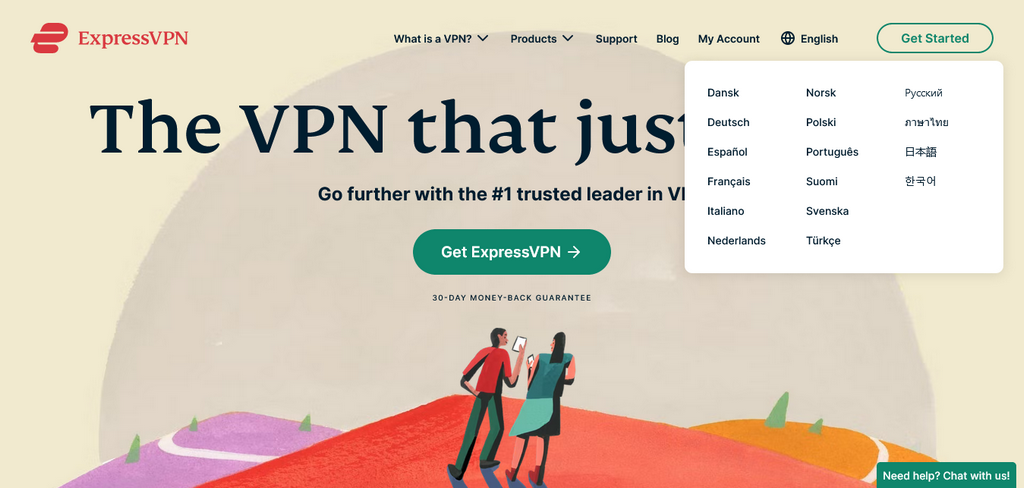
ExpressVPN is one of the big industry players, and although it went through a few hiccups at the beginning of the pandemic it has made strides to recover. Today, it remains a reliable, secure and fast VPN.
It used to have servers in Russia but they have since been shut down.
For Russian users, it encrypts internet traffic and gives them access to blocked websites. You can use it to stream from most major platforms and it is an excellent choice for accessing news sites like CNN and BBC.
The company has servers in Lithuania, Estonia, Latvia and Poland, as well as other countries in Eastern Europe.
| Pros | Cons |
| The company has servers in Lithuania, Latvia and Estonia | It is one of the more expensive VPNs |
| It is a secure service with military-grade encryption | The service has fewer features than some leading VPNs |
| You can pay for the VPN with bitcoin | You only get 5 simultaneous connections |
| It is fast – use it for gaming and streaming | |
| The apps are well designed with a good UX | |
| ExpressVPN doesn't keep user logs | |
| The service is well supported | |
| It has 3,000+ servers | |
| The company is in the British Virgin Islands | |
| The VPN has a 30-day money-back guarantee |
FAQ
- How to get a Russian IP address?
Many Russians in the diaspora often ask “How can I watch Russian TV abroad?” Russia-1 and ivi.TV are both Russian TV channels that have great shows. Unfortunately, you have to be in Russia to gain access.
In the past, Russians in the diaspora accessed Russian TV by buying a VPN like Surfshark or ExpressVPN and then connecting through a Russian server.
Unfortunately, this is no longer possible. All the best VPNs have now closed down their Russian servers, so you cannot get a Russian IP address.
- Should I use a free Russia VPN?
A free VPN is never a good idea. When it comes to VPNs “free” is never “free” – you pay for it one way or another. Free VPNs have to find ways to monetize, and they often sell user details to cover their expenses.
If you choose a free VPN you should not expect your private details and other information to remain private.
Free VPNs also have bandwidth caps and are usually quite slow.
- Why do I need a VPN in Russia?
You need a VPN for Russia because many important sites are blocked. If you are in Russia you don’t have access to Facebook, Instagram, Twitter, BBC News, CNN, DW News, AOL, Google News, Pravda and many more.
Since the Ukraine war started, the Kremlin has blocked thousands of sites, and the only way you can access them is with a VPN.
- Are VPNs legal in Russia?
VPNs are legal in Russia, by they are limited. VPNs are required to register with the government and provide access to user details, which goes against what VPNs are all about in the first place – privacy and security.
For that reason, most VPNs have opted to close their Russian servers rather than cooperate with the Kremlin to stifle basic internet freedom.
Conclusion
Russia has tried to limit what information its citizens can access online for a long time. They blocked many sites and tried to force VPNs and other proxies to surrender user details.
Today, the government is using these same internet censorship tactics to control public access to information about the war in Ukraine.
You can get around internet blocks with a Russia VPN. After you install, choose a server location and you’ll be assigned a new IP address that hides your true location.
A VPN for Russia also encrypts your data making it useless to anyone who may intercept it.
The best VPN for Russia is one that takes security and privacy seriously, is fast and allows you to access geo-blocked websites.


